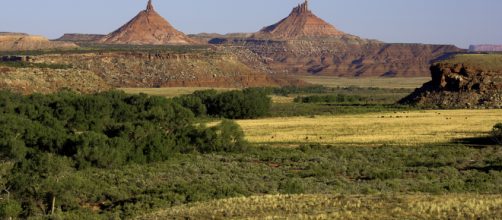Salt Lake City — On Monday, President Donald Trump drastically slashed the size of two National Monuments in Utah by nearly two million acres, the largest cut of federally protected land ever by an American president.
President Trump announced the reductions of Bears Ears National Monument and the Grand Staircase-Escalante National Monument, in a speech at the Utah capitol building. The move, which reduces Bears Ears by 1.1 million acres and Grand Staircase Escalante by 800,000 acres, rolls back proclamations by Presidents Barack Obama and Bill Clinton, and are likely to spark an intense legal battle in the coming days.
Many are claiming Trump doesn't have the authority
According to the Desert (Salt Lake City) News, eight conservation groups have already filed suit, claiming the president does not possess the legal authority under the Antiquities Act of 1906 to roll back the Presidential Proclamations protecting national monuments.
After the president’s announcement, Stephanie Meeks, president, and CEO of the National Trust for Historic Preservation said in a statement that, “President Trump’s dramatic reduction of the Bears Ears National Monument is a direct attack on the Antiquities Act and America’s public lands. We intend to challenge this action in federal court."
The lawsuit claims in part, “The Act authorizes Presidents to create national monuments; it does not authorize Presidents to abolish them either in whole or in part…”
President Trump made the argument that the restrictions on the land have infringed on the local way of life and slowed down “responsible economic development,” adding, “public lands will once again be for public use.”
Some are concerned the reduction in size is an attempt to farm the areas natural resources
According to a study by the Center for American Progress, a progressive public policy research and advocacy organization, Bears Ears contains a “wealth of uranium and other natural deposits [which] makes its protection as a national monument even more critical.”
A spokesman for the center, Matt Lee-Ashley said, “The area has slightly above-average resource potential, but there are no signs that it’s a big play.”
In her statement, Meeks said, “The President’s action also opens the remarkable Bears Ears’ landscape to incompatible oil and gas development.”
Matt Anderson with Sutherland Institute, a conservative public policy think tank in Utah, argues the designation cripples rural communities.
“When you designate a large national monument, you restrict access to the land and you block traditional uses of the land.” He went on to add that reducing the monuments still protects the critical areas, but keeps the area available to locals that depend on the land for their livelihood.


